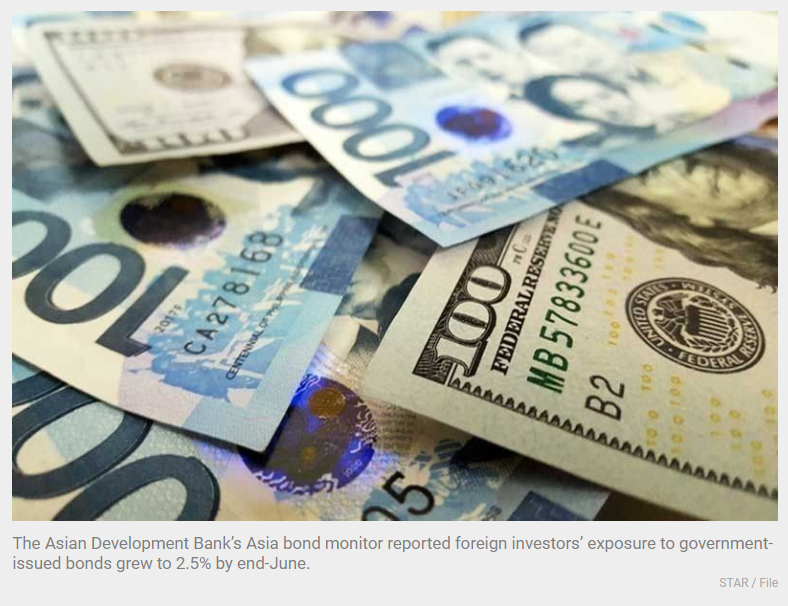Foreign appetite for Philippine debt returned in Q2 — ADB
MANILA, Philippines — Foreign investors are back in the Philippine debt market in the second quarter, fueled by optimism over further reopening of the economy and low coronavirus caseloads at the time.
Foreign investors’ exposure to government-issued bonds grew 0.2 percentage points quarter-on-quarter to 2.5% by end-June, the Asian Development Bank said in its quarterly “Asia Bond Monitor” report released Wednesday,
This was a turnaround from 0.5% quarterly drop in foreign holdings of peso-denominated government bonds recorded in the first quarter. “The increase in foreign holdings in Q2 2021 was supported by fund inflows amid relatively few COVID-19 cases at that time, which in turn persuaded the government to hasten the reopening of the economy,” the ADB said.
It has been a conscious choice of the Duterte administration to minimize its foreign exposure to protect the government from sharp foreign currency fluctuations that could bloat the value of its external debts. But the return of foreign investors to the local debt market gives the government more funding options especially for its costly pandemic response.
According to the Manila-based lender, foreign appetite for Philippine government bonds “recovered” quarter-on-quarter, as the local financial market received a net inflow of $0.3 billion in the second quarter. Specifically, a “rebound” in foreign fund inflows occurred in May and June, with both months receiving $0.5 billion each due to “continued reopening of the economy” back then.
That inrush of foreign investments at home mirrored a broader inflows across emerging East Asian markets, ADB said, although the movements of foreign capital was generally mixed during the second quarter. Apart from the Philippines, ADB said China and Thailand also saw a quarterly increase in foreign ownership of government-issued bonds.
On the flip side, foreign holdings of Indonesian government bonds continued to shrink in the second quarter, albeit “marginally”, as rising COVID-19 cases there hurt foreign sentiment. Meanwhile, the share of foreigners holding state bonds in Malaysia and Vietnam was almost unchanged during the period.
“Differences in the stage of economic recovery and the associated risks among economies in the region largely influenced the portfolio management of foreign investors,” ADB said.
‘Meek’ corporate bonds
Despite the foreign fund inflows, fewer bonds were issued by Philippine-based corporates in the second quarter, as the protracted weakness in consumer confidence gives companies no valid reason to raise fresh capital for business expansion. During the period, bond issuance activity of companies declined 20.2% quarter-on-quarter, a deeper slump compared with 0.2% sequential fall in the first three months of the year.
Meanwhile, the total volume of debts issued in the corporate sector sagged to P47 billion.
“The reduced debt sales from the corporate sector were due to economic prospects remaining gloomy amid a resurgence of COVID-19 cases that negatively affected business and consumer confidence,” the ADB report said.
“This prompted firms to hold off on expanding or operating above pre-Covid pandemic levels that would require capital mobilization,” it added.
The good news is any plans to borrow in the future would be affordable as interest rates have fallen. With the central bank cutting benchmark rates to record-lows, ADB said yields of government bonds fell for all tenors between June 15 and August 15, except for 7-year and 10-year debt papers, thanks to easing inflation.
“Financial conditions in emerging East Asia remained stable amid accommodative policy stances, with some headwinds observed due to looming uncertainty on recovery paths,” the lender said.
Source: https://www.philstar.com/business/2021/09/15/2127302/foreign-appetite-philippine-debt-returned-q2-adb


 English
English




